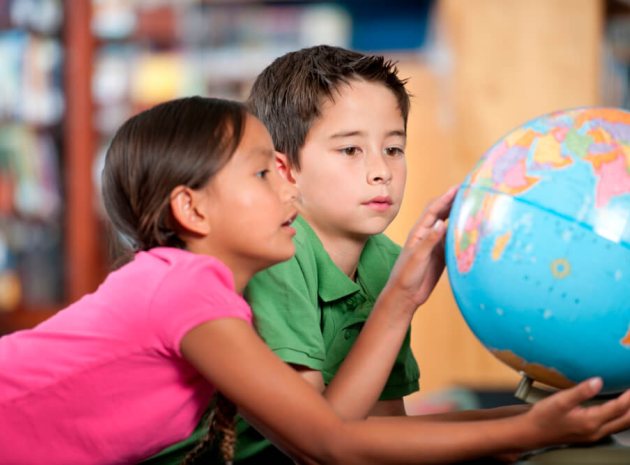In 4,775 schools located in 153 countries, 1.4 million students are becoming inquiring, knowledgeable and caring young people who will help to create a better, more-peaceful world through intercultural understanding and respect.
They are learning in International Baccalaureate (IB) programmes that are offered to students ages 3 to 19.
The continuum of IB programmes has grown over the organisation’s 50-year history. The IB, a nonprofit organisation, was founded in 1968 by educators, and its Diploma Programme (DP) for students ages 16 to 19 was implemented in seven schools. The programme aims to develop students who have excellent breadth and depth of knowledge and flourish physically, intellectually and emotionally.
In 1994, the IB launched the Middle Years Programme (MYP), which encourages students ages 11 to 16 to make practical connections between their studies and the real world. Students of all interests and academic abilities can benefit from participating in the MYP.
Three years later, the Primary Years Programme (PYP) was introduced. The PYP prepares students ages 3 to 12 to become active, caring, lifelong learners. It focuses on the development of the whole child.
The most recent programme to be offered is the Career-related Programme (CP). Designed for students ages 16 to 19, the CP addresses the needs of students engaged in career-related education. It leads to further and higher education, apprenticeships or employment.
The IB focuses on each student as a whole person with distinctive learning styles, strengths and challenges. IB programmes provide a well-rounded education that inspires students, meets rigorous international standards and fulfils national curriculum requirements. They help students learn to ask challenging questions, think critically and develop research skills proven to help them in higher education. Students learn how to learn and to value learning as an essential, integral part of their everyday lives.
Teachers in IB World Schools—schools authorised to offer one of the four IB programmes—are given access to high-quality professional development, offered both face-to-face and online, that encourages critical thinking, self-reflection and dedication to lifelong learning and continuous improvement.
Each IB programme, while part of a continuum, provides effective approaches to teaching and learning for its age group. Research suggests that in many cases, IB students perform better than students taking other qualifications. For example, a global study investigating performance in the PYP and MYP found that the IB students outperformed their non-IB peers in mathematics, reading, narrative writing and expository writing. In addition, qualitative data from a 2014 study on the DP in the USA suggested that students who participated in the DP are more academically adjusted to the rigour and expectations of university.
Much thought has gone into the Diploma Programme curriculum, which consists of a core and six subject groups. Made up of three required components, the DP core aims to broaden students’ educational experience and challenge them to apply their knowledge and skills.
The three core elements are:
• The extended essay, which is an independent piece of research, finishes with a 4,000-word paper. It provides practical preparation for undergraduate research.
• Theory of knowledge, in which students reflect on the nature of knowledge and on how we know what we claim to know, is assessed through an oral presentation and a 1,600-word essay.
• Creativity, activity, service, which has students complete a project related to these three concepts.
The six subject groups are studies in language and literature; language acquisition; individuals and societies; sciences; mathematics; and the arts. More than 3,100 schools offer the DP in 153 countries.
As 21st-century life places complex demands on graduates looking for work, enabling students to become self-confident, skilled, career-ready learners must be an integral part of their education. Students in the Career-related Programme develop skills that are valued by both employers and universities.
CP students take at least two DP courses, a career-related study and a core. Each school selects the two DP courses it offers and the career-related study program best suited to the needs of its students.
The CP core consists of three courses—approaches to learning, community and service, and language development—and a reflective project. The approaches to learning course aims to develop responsibility, practical problem-solving and good intellectual habits. Through the service course, students practice decision-making, problem-solving and initiative. Language development exposes students to a second language. For the reflective project, students analyse an ethical dilemma relevant to their career-related studies. Launched in 2014, the IB’s newest programme is offered in more than 210 schools in 23 countries.
Students do a great deal of growing up and changing between the ages of 11 and 16. The Middle Years Programme, which is a whole-school programme, keeps them engaged with learning designed specifically for the age group. The MYP motivates students and helps them to achieve success in school and in life beyond the classroom.
A wide range of curriculum requirements can be met through the programme’s flexible curriculum, which comprises eight subject groups:
• language acquisition
• language and literature
• individuals and societies
• sciences
• mathematics
• arts
• physical and health education
• design
In 2015, the IB began offering MYP eAssessment, which uses long-term project work, optional portfolio assessments and optional on-screen exams to assess what students know and can do. More than 1,350 schools in some 108 countries have implemented the MYP.
The first few years of school help young students build a solid foundation as they begin to value education and develop the academic, social and emotional skills they need in order to learn. Informed by research into how children learn, how educators teach and the principles and practices of effective assessment, the Primary Years Programme emphasises inquiry-based learning.
Thus, rather than beginning with a list of subjects, the PYP is underpinned by six transdisciplinary themes around which learning is planned:
• who we are
• where we are in place and time
• how we express ourselves
• how the world works
• how we organise ourselves
• sharing the planet.
Subjects are incorporated into each transdisciplinary theme to guide, support, enrich and connect learning. In other words, the PYP provides a flexible curriculum framework so that school communities can adapt the programme to fit their own school context. More than 1,470 schools offer the PYP in over 100 countries.
An IB education calls forth the very best in students and educators alike. The IB believes that together we can help to prepare students for living and working in our complex, highly interconnected world.
To find out more head to ibo.org, follow on Twitter at @iborganization or email ibid@ibo.org.










